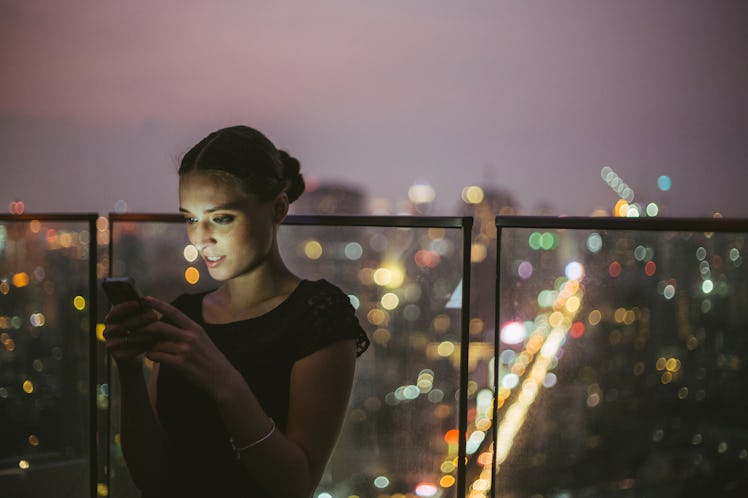
Science Says Your Twitter Can Reveal More About Your Mental Health Than You Might Realize
Sometimes we use social media as a way to escape from issues or stressors in our IRL daily lives. Other times, we use it as a vessel to actually communicate those same problems, which is why social media use can be such a double-edged sword for some people. But the connection between social media profiles and psychology might be even stronger than you think, according to a new study, which set out to discover what your Twitter says about you and your mental health.
The research, which was conducted by the University of Pennsylvania, found that Twitter users with ADHD tended to tweet differently than those without ADHD, in a variety of ways: They were found to be less agreeable, to post more often and openly, and to swear more often than Twitter users who didn't have ADHD, according to the research.
Here's how the study went down: The researchers analyzed approximately 1.3 million tweets written by 1,399 Twitter users, all of whom had self-reported ADHD. The study then cross-referenced these posts with other tweets written by people who don't have ADHD, but were of the same age, gender, and who used Twitter for the same periods of time.
The researchers were able to predict whether someone had ADHD or not strictly based off of their Twitter content, with 83 percent accuracy.
ADHD is an acronym for attention deficit hyperactivity disorder, and symptoms of the condition include inattention, hyperactivity, and impulsivity, all of which could potentially mix with the immediacy and availability of Twitter to create a tense environment. This doesn't mean that all people with ADHD are always less agreeable, nor does it mean they're always more open than others in real life. Rather, this research demonstrates that social media can be the ultimate outlet of emotional expression for any person.
The idea of social media being a portal to our inner psychology is, obviously, pretty controversial. After all, everyone — not just people who have ADHD — can act differently on social media than how they do in real life. People are known to say meaner things online than they ever would in person, while others treat social media as a complete joke, posting memes instead of anything heartfelt.
But when a study like this comes along, it inevitably asks you to think about how you approach your own social media presence. It's pretty easy to forget that our social media accounts do represent us and who we are as people in some sense, whether we like it or not.
This study is not the first of its kind, but rather one of several studies done in the last 10 years or so looking at the connection between mental health and social media usage. Such research has also shown a strong correlation between social media use and depression: The more time young adults spend on social media, the more likely they are to become depressed. Yet another study found that Instagram is the worst social media network for mental health, as it can trigger heightened feelings of anxiety and insecurity. YouTube, on the other hand, is said to be the best social media network for positive self-perception — which makes sense, because YouTube is popular for more non-controversial types of content, like makeup and cooking tutorials.
Even if you aren't posting much, your consumption of social media might still reveal something about your mental health.
Of course, there's no one-size-fits-all rule for social media, or what it means to any given user. We've all said or done something via social media that resulted in feelings of regret. It's not the end of the world if you accidentally got too carried away tweeting about T-Swift's new Reputation album.
Generally speaking, though, it's always helpful to mindfully practice healthy behaviors on social media, to give you that much-needed perspective we often lose when we're on hour seven of scrolling through bottomless news feeds.
To make sure your own personal relationship with your social feeds isn't a toxic one, try to limit the amount of time you spend on any given outlet There's nothing wrong with checking on your latest Instagram post a few times throughout the day, but after that, your reflex is just that — a reflex. Try using that energy for something a bit more constructive, like a conversation with a co-worker you haven't caught up with in a while, or a walk outside to clear your head when stress is running high. Your mind and your eyes will thank you for it.
Another good practice is to stop following or communicating with social media users who make you feel bad about yourself.
You know exactly what I'm talking about. If that Instagram model with seven golden retrievers and a house in Bali is making you miserable, unfollow her.
Of course, you can't — and shouldn't — approach IRL relationships the exact same way, but it's worth reminding yourself that these social media relationships are not always real, and if you're pining after a digitally perfect world, remember this person's world is definitely not perfect, no matter how great they make it look online, and yours isn't perfect either — and that's completely fine.
Social media can be an excellent way to learn about people and experiences that differ from your own, or to increase the number of voices heard in moments of social activism. But it's not a binary mental health analysis, nor should it be the main source of solace for anyone going through a hard time.
If you're having an especially hard time, as always, you should consider the possibility of speaking with a licensed professional about your concerns. Everyone deserves to feel their best, both online and in real life.